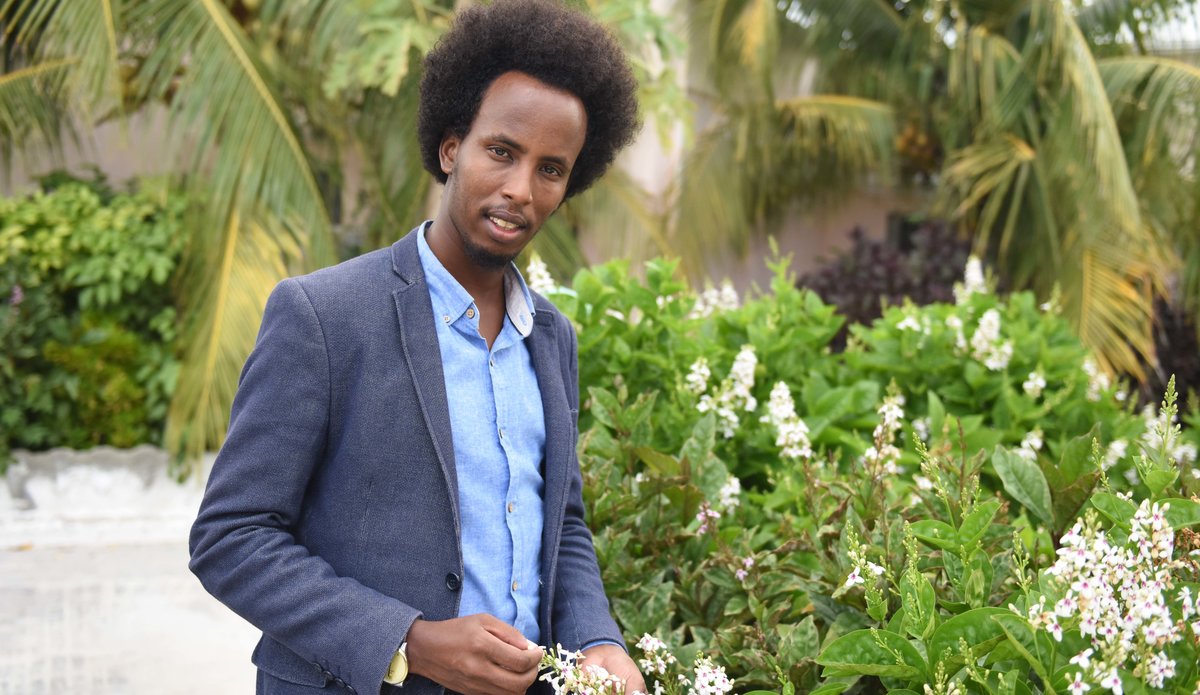University graduate spearheads project to beautify Mogadishu
Mogadishu - Mohamed Tahlil Mohamed is brimming over with ideas. The 27-year-old university graduate is one of the initiators of “City Flowers”, a youth-led project that seeks to erase the scars of war from the streets of the Somali capital and beautify the whole city.
Started in July 2016, “City Flowers” mobilizes young people to clean up Mogadishu and make it a more livable city.
“We consulted each other on what changes we can bring as youth. We then came up with the initiative of flowers of peace. We started planting flowers along the main roads such as the Maka Al-Mukarama Road and other areas,” Mohamed explains.
As a driving force of this project, Mohamed is happy to see his efforts already paying off. It is easy to spot manicured flower gardens alongside newly painted road kerbs, thanks to “City Flowers”.
“Flowers are attractive and symbolize peace,” Mohamed explains. “We made voluntary contributions of money and planted the flowers. Initially, the flower beds were not fenced, and animals grazed on the plants, destroying them. We then came up with ways to fence off the flower beds,” he adds.
Mohamed gets his motivation from a deeply felt need to restore the past glory of Mogadishu, of which he has heard many stories. Personally, Mohamed has no recollection of pre-war Somalia, having been born in 1990, a year before the civil war broke out.
A native of Cadaado in Galgadud region, Mohamed and his family experienced Somalia’s darkest years, choosing to remain in the country even at the height of the fighting.
He went to school in Mogadishu and later moved to Malaysia, where he obtained a Master’s Degree in Business Administration. Soon after his graduation, Mohamed returned to Somalia to help rebuild his country.
“We are young people who want to change the image of our city, the damage and ruins left by the civil war,” he says, emphasizing his resolve to give back to his country. “I would like to see Mogadishu become like any other city in the world. We want to restore its beauty and completely remove the remnants of the civil war.”
Mohamed is one of thousands of young Somalis who are changing the destiny of their country through social enterprises. With one of the youngest demographic profiles in the world, Somalia’s future depends on its youth, who constitute an estimated 81.5 per cent of the population.
Mohamed’s spirit of initiative and positive determination embodies the UN agenda for youth. The United Nations emphasizes the importance of youth participation in peacebuilding and development efforts in Somalia.
Apart from the city facelift, Mohamed and his youth group have also partnered with the Banadir Regional Administration, which governs Mogadishu city, to implement a road safety campaign. The initiative involves the marking and installation of road signs to promote the safety of pedestrians.
“When we wanted to paint a pedestrian crossing, I had to use instructions from ‘Google’ to learn how it is done,” Mohamed explains. Through sheer determination, the pedestrian crossings are now standardized.
Despite these efforts, there are skeptics. “Some people misunderstood the work that we do. When they see us planting flowers, they think we are funded by international non-governmental organizations. But I tell them that this is our country and we have to build it, without depending on support from outside. Every country is built by its people. It is our responsibility, not foreigners’, to rebuild Somalia,” he emphasizes.
Mohamed and his youth group plan to expand the beautification and road safety projects to state capitals across Somalia. In addition to these projects, the group also organizes games and other activities for young people. Most recently, they organized a peace gala for youths from all of Mogadishu’s 17 districts.
“Through the gala, we bring together youth from the different neighborhoods of Mogadishu to play and get to know each other. This is part of peacebuilding and helps youth discover and explore their potential,” Mohamed remarks.
He adds that such activities encourage youths to maintain a healthy lifestyle and stay away from crime. “Our intention is to represent Somalia, build youth’s self-confidence and understanding that we are all important for the country and can contribute to its development,” he says.
The UN officially recognizes youth development as one of the priorities of its mandate. In Somalia, the UN recognizes the crucial role young Somalis play as partners in the country's peace- and state building processes.
 UN
UN





